Homeowners installing a new septic system often ask: “How long does a septic system last?”
The answer depends on multiple factors, such as the type of septic system and its maintenance.
In this post we will investigating the lifetime expectancy of septic systems and ways to extend it. Even if no septic system lasts for a lifetime, with proper care it can provide service for decades.
Can a septic system last 50 years?
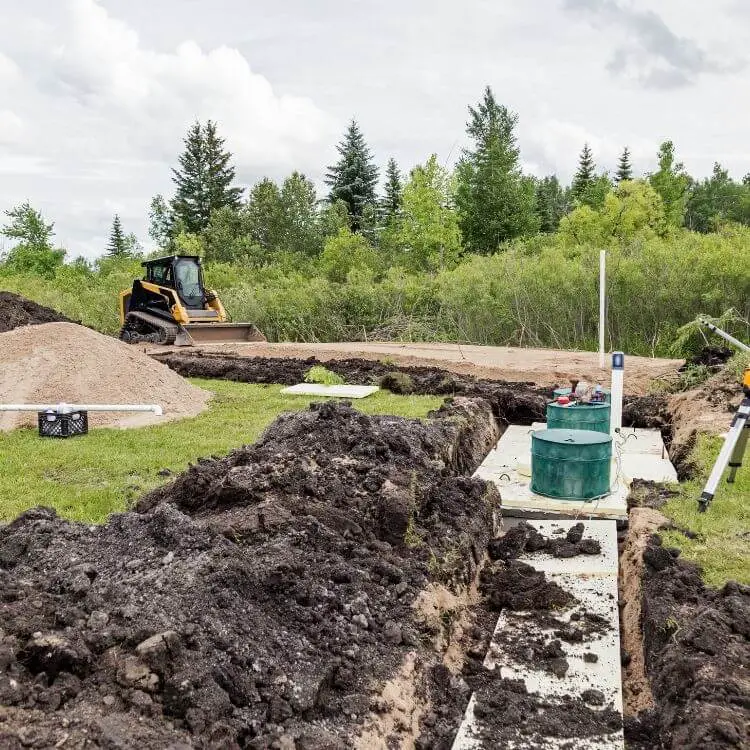
The answer can be yes, under certain circumstances.
It is possible for a septic system to last for half a century if you maintain it properly.
How Long Does a Septic System Last?
One aspect you need to consider when it comes to septic system life expectancy is its type. Some septic system types last longer, while others last less. Here’s how much a septic system lasts, depending on its type:
- Gravity system – 25-30 years
- Pressure distribution system – 25-30 years but you will need to replace the pump sooner
- Aerobic treatment unit – up to 40 years
- Mound system – 20-25 years
- Sand filter system – 15-25 years for the sand filter
- Proprietary systems – as declared by the manufacturer
When choosing the best septic system for your property, you should not look just at its duration of use. It’s important to determine which system suits your needs and soil condition. You should also ask for professional advice and determine which system provides more value for money.
What influences the life duration of a septic system?
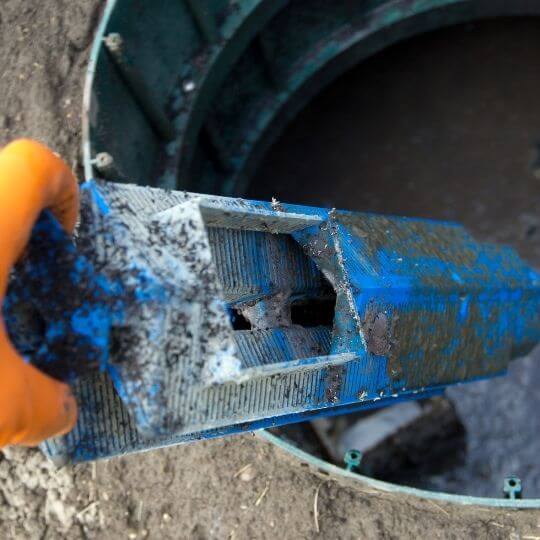
The estimated life duration of a septic system is not cast in stone. There are multiple factors that can influence it:
- The number of people using it
The more water appliances you have in your home, the more wastewater your septic system will have to manage.
The general estimation is that around 110 gallons of water are used every day per bedroom. A house with more bedrooms will generally produce more wastewater.
- Household products usage
Your septic system needs bacteria to function properly. If you use products that are harmful to bacteria, your septic system could be affected. Avoid products that contain chemical pollutants.
- Soil quality
The quality of soil influences the durability of your septic tank. Groundwater that is acidic can corrode a concrete septic tank, so consult an engineer before installing a septic system.
- Drain field installation
How the leach field is installed has a direct influence on your septic system longevity. Important details are the depth of the water table, the dimensions of the drain field, and the type of gravel.
- Effluent discharge system
The method the septic system uses to discharge effluent can also have an impact on the longevity of septic systems. When the drain field is overloaded with too much wastewater, this reduces the percolation rate.
- Maintenance
A septic system that is maintained regularly will last, in average, longer than one that is neglected. Later we will present the best practices for maintaining your septic system in good working condition.
Factors that could shorten your septic system life expectancy
Here are some mistakes you could make and shorten the life of your septic system:
- Using a lot of water within a short timeframe
When a septic tank receives too much water at short intervals, the wastewater could be forced out of the septic tank. The extra water will reach the drain field before the bacteria finish breaking down organic waste. Solids don’t have time to settle down and end up in the drain field, causing the system to fail.
- Not desludging regularly
Inside a septic tank, solid organic waste settles at the bottom, while the grease settles at the top. The latter forms the scum layer, while the relatively clean effluent stays in the middle.
When the scum level is too high, some solid particles can escape with the effluent. In time, they can cause the drain field to clog. As a result, the leach field cannot absorb effluent properly and causes backups and bad odor.
- Regular use
No septic system lasts forever without regular repairs. All septic systems eventually fail just from normal use. Solid particles escaping in the drain field represent one of the most common causes of failed septic systems.
How long do septic system parts last?
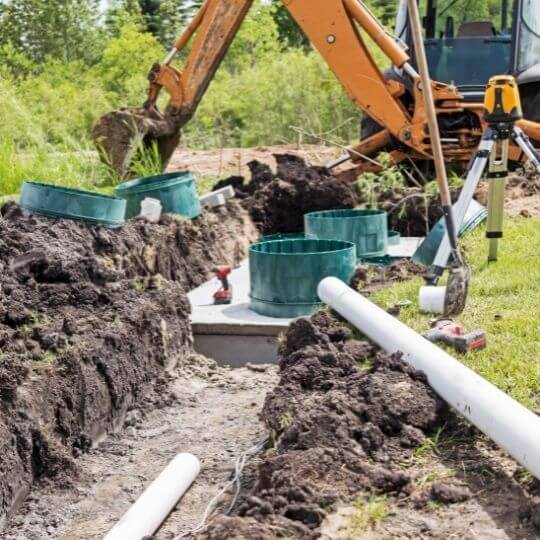
A very useful piece of information is “How long does a septic tank pump last?”
A septic tank pump will last between 5 and 7 years (residential type) and between 5 and 15 years (commercial). Its life expectancy depends on various factors, such as quality, type of electric supply, and frequency of use.
The most common septic tank pump problems include:
- Blown fuse
- Defective float switch
- Defective motor
- Plugged anti-airlock hole
- Valve installed incorrectly
- Plugged pump inlet
- Vertical elevation too much for the pump to handle
- Obstructed float.
However, there are also other parts that come into a septic tank, including:
- The pipe from the home – 70 years or more for modern PVC drain pipes
- Effluent filter – 3 to 5 years, but it can be cleaned and reused
- Lids – variable duration depending on quality of materials
- The tank – lasting 30 years or more, depending on materials used
Septic system tanks can be made from different materials, which can last less or more. Concrete tanks are the most popular, as they can last for decades in the absence of corrosion.
Steel septic tanks are generally avoided because of the cost and vulnerability to rust. Their structure can weaken as early as 15 years after being installed.
Plastic septic tanks are popular, too, and can last more than 30 years. Downsides of plastic are susceptibility to damage by weight from above and the tank possibly rising if it’s too light.
How long does it take to replace a septic tank?
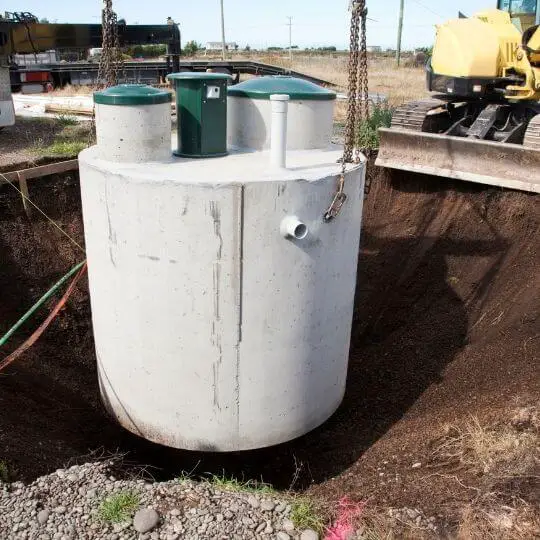
Do you think you need to replace your septic tank? This can be necessary in case of rupture or extreme corrosion.
How long does it take to replace a septic tank, then?
Installing a new septic system can last anywhere between one day and several days.
Removing and replacing the old tank can be time consuming and last one or two days.
Next, you will also need to replace the leach field, which also could take a day or two.
Replacement can be faster than initial installation because you don’t need to excavate. When installing a new septic tank, you may also need to get certain permits from local authorities.
Whether you build a new septic system or repair an older one, one factor stays the same: weather. If weather does not permit working in your yard, your progress can be delayed for days. Before starting, check the weather forecast for the next 7 days to make sure you can work without inconveniences.
Signs it’s time to replace a septic system
Whether you buy a new home or have been living in one for many years, you need to know septic. Any person benefits from knowing the basics of septic systems and how they work.
Using water facilities inside your house and knowing that wastewater goes where it should is amazing.
However, don’t take this for granted.
If something is going wrong inside your septic system, you will no longer benefit from the miracle of modern plumbing. If wastewater does not go down the drain, your kitchen and bathrooms become useless.
The important thing is to know in time that your septic system is in trouble. [1]
The most common signs of a failing septic system include:
- Sewage backing up into your home from toilets, drains, and sinks;
- Gurgling sounds in your plumbing system;
- Drains not evacuating water efficiently;
- Bad odors around the septic tank or drain field;
- Standing water or damp spots around the septic tank;
- Lush green grass on top of the septic tank, even in dry weather;
- An increase in the levels of nitrates and coliform bacteria in water wells.
If you notice one or more of these signs, investigate the problem immediately.
A malfunctioning septic system should not be ignored. It is a risk to human health and can pollute the environment by releasing untreated water into the surrounding soil. Sewage can come to the surface of the tank or back up in pipes in the building, spreading dangerous pathogens. [2]
Septic systems that are not properly maintained can contaminate water sources and make them unsafe. They can have a negative impact on drinking water, swimming activities, agricultural uses of water, and shellfish harvesting.
Intervening in time will protect the environment from negative impact but also lower your repair bills. So, the question is not necessarily “how long does a septic system last?”, but how should you take care of it.
How to prolong the life of your septic system – best maintenance practices
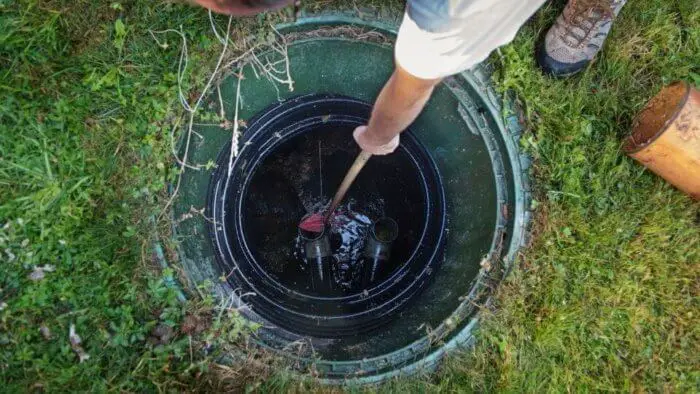
Septic tank maintenance is a chapter that any homeowner using a septic system should learn. Taking care of your septic system will ensure your comfort and also enable you to lower repair costs. [3]
Here are the best practices for maintaining your septic system:
- Regular inspections
Routine maintenance is required as it enables you to spot potential problems in time. A gravity system needs inspection every three years. Other types such as sand filter systems or pressure distribution should be checked annually.
- Pumping regularly
The more wastewater your produce, the more often you need to pump the septic system. The role of the pumping is to eliminate solid matter so it does not contaminate the effluent. When solid particles enter the effluent, they can damage the pump that evacuates treated water out of the septic tank.
Most septic systems need pumping approximately every two years. However, you should check for signs that your septic tank needs desludging, such as:
- The sludge level reaching 1 foot at the bottom of the tank;
- The scum becoming almost 6 inches thick at the top of the tank.
- Using water wisely
Using less water can increase the life duration of your septic system. Using too much water is often a cause of failed septic systems. Simple tips for using less water include:
- Checking plumbing for leaks;
- Taking shorter showers;
- Installing water flow restrictors;
- Turning off water while brushing your teeth or shaving;
- Using washing machines or dishwasher with full loads only.
- Avoiding garbage disposals
These devices add solids and grease to wastewater, making it more difficult to treat. Limit your use of a garbage disposal as much as possible.
- Being careful what you flush
Only human waster and toilet paper should go in your toilet. Items such as cleaning wipes, facial tissue, paper towels, and feminine products can clog your drain and damage septic systems.
- Protecting the drain field
Your drain field could get damaged, too. Car parking, sports courts, grazing animals, and patios should be avoided in the drain field area. Also, don’t plant trees too close to drain fields. All these can cause pipes to break.
- Avoiding chemical drain cleaners
Be mindful of what you pour down the drain. Harsh chemicals can damage the living organisms that digest bacteria in wastewater. Toxins that reach the septic tank can kill these organisms and have a negative effect on septic system performance.
How long does a septic system last? – Final Word
So, what is the answer to the question: how long does a septic system last?
It depends on multiple factors.
The most important factor is ensuring proper maintenance.
A septic system that is carefully maintained can last as long as 50 years. Not taking care of your septic system can cause it to fail in less than a decade.

Michael Davis is a heating & plumbing expert who currently works as independent contractor in SC. He also writes for Plumbertip.
For almost 10 years he worked on various plumbing tasks across South Carolina.


